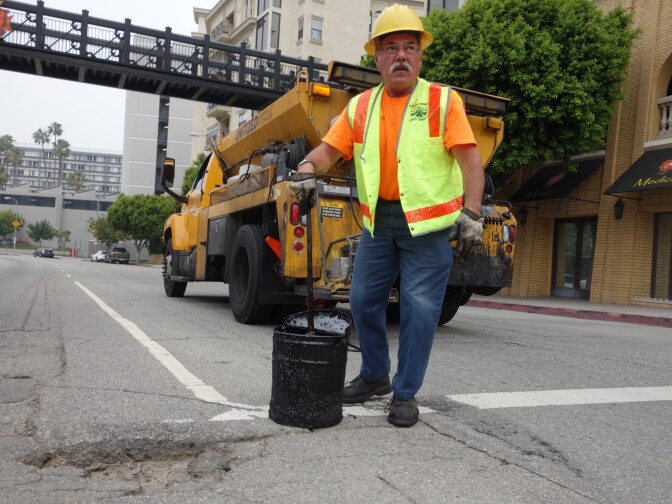This story is free to read because readers choose to support LAist. If you find value in independent local reporting, make a donation to power our newsroom today.
This archival content was originally written for and published on KPCC.org. Keep in mind that links and images may no longer work — and references may be outdated.
LA bureau seeks $90K grant for app to speed pothole repair work after unfavorable audit
The Los Angeles Bureau of Street Services has applied for a $90,000 grant from Mayor Eric Garcetti's $1 million Innovation Fund to buy an Android app to digitize the department's pothole filling work.
This comes a year after a City Controller audit blasted the bureau for inconsistent and inaccurate record keeping. The bureau still uses a paper-based system to dispatch pothole crews and record their work.
The grant is small compared with the $7 million to $8 million the bureau spends each year filling potholes.
The Bureau plans to use the GPS on Android smart phones to track pothole trucks and work crews and to enable quicker dispatching of the nearest trucks to newly reported potholes. Workers would use the phones to take before-and-after photos to document their work.
The app would help move the workflow off a combination of computers and paper records into an all-digital data stream, said Greg Spotts, acting assistant director of the Bureau of Street Services.
Potholes are serious business in the Los Angeles region. The national transportation research organization TRIP estimates L.A.'s bad roads add about $800 more per year in operating costs over the average that vehicle owners pay in other large cities. Angelenos drive on roads that rate the worst among 75 large U.S. cities, the group says.
A million potholes? Prove it.
The City Controller's audit of the Bureau of Street Services came out in July, and its criticism still reverberates in City Hall, surfacing in budget hearings and inspiring motions by council members to correct shortcomings.
One finding questioned whether the Bureau truly had filled 953,339 potholes in the three years ending in 2013. During those recession-stressed years, as road crews were cut back, the Bureau reported spending nearly $24 million on pothole repairs.
Spotts said the Bureau had the documentation needed to prove it filled all those potholes over the three-year audit period, but because the records were on paper, they were difficult to produce.
"We have that information, but it's in boxes in storage. We are not able to have a live search of that information," Spotts said.
Controller Ron Galperin's spokesman Lowell Goodman said the lack of documentation was not merely a paper records problem. Bureau representatives told the auditors that documents were missing.
The audit said the Bureau's record-keeping methods were inconsistent. Plus, the documents that were provided about potholes didn't add up to what the Bureau was telling the mayor's office, Goodman said.
Controller auditors compared staffers' daily reports of pothole repairs with the numbers that Bureau managers reported to the mayor's office and found they didn't match. In 2012-13, the Bureau reported to the mayor it had filled 50,500 more potholes than its source records showed, the Controller's audit said. There were smaller discrepancies in two prior years as well.
Mayor Eric Garcetti's administration has focused heavily on performance metrics, and the Bureau of Street Services has steadily promised to up its pothole filling game. In 2010, the Bureau of Street Services goal was to fill a quarter-million potholes a year. By in 2012-13 that goal has swelled to 350,000.















